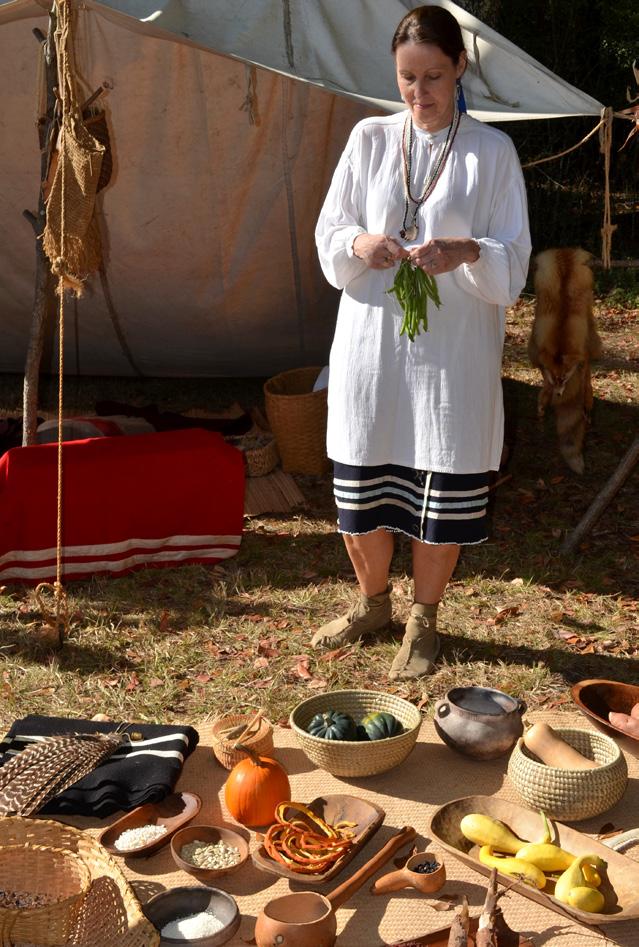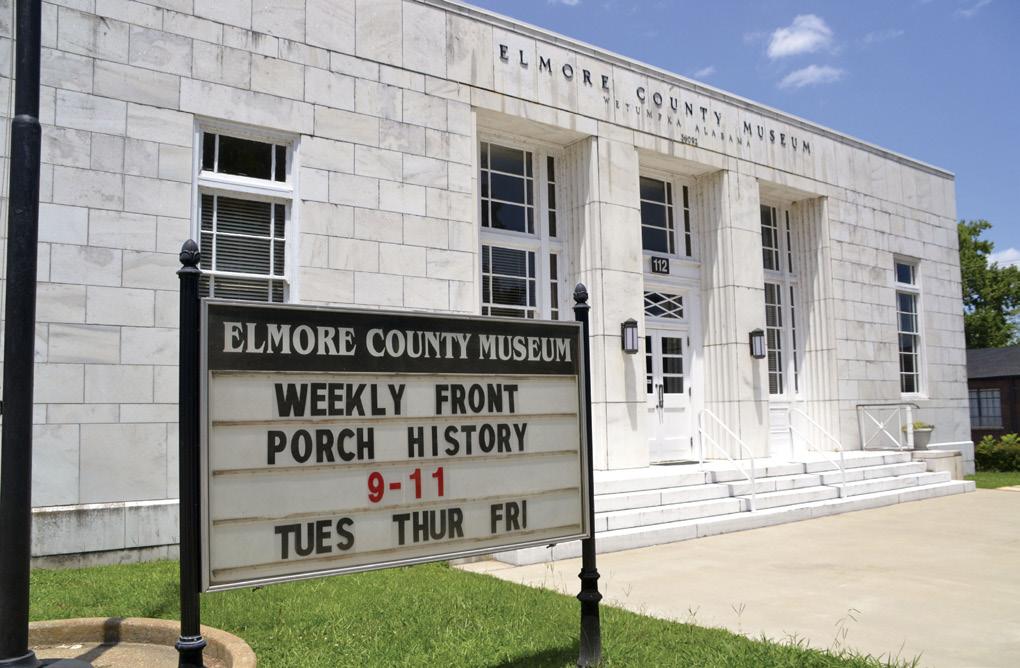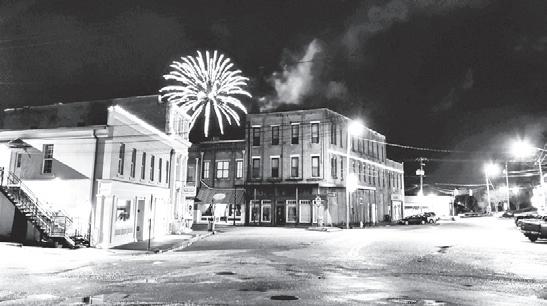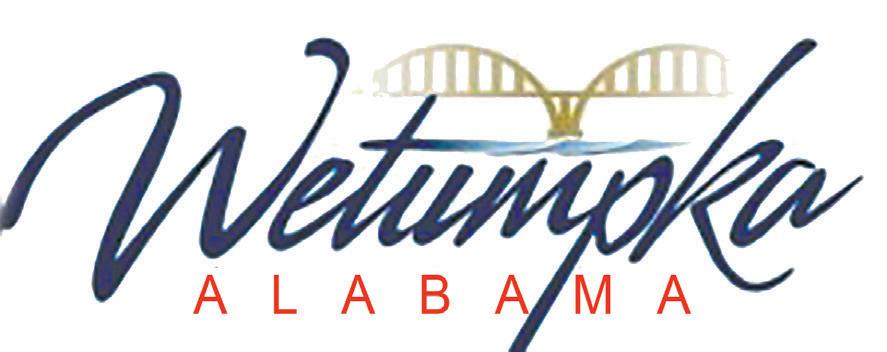
7 minute read
Steeped in History
County steeped in rich history
TALLASSEE FALLS MUSEUM
Elmore County is rich in history. In Tallassee, the Tallassee Falls Museum has an impressive display of artifacts. The Tallassee Falls Museum, a part of the Talisi Historical Preservation Society, opened on June 7, 2013. Its name is derived from the well-known Tallassee Falls on the Tallapoosa River. The mighty waterfalls are now home to Thurlow Dam and early in the city’s history they were home to the Tallassee Falls Manufacturing Company, one of the early names for the Tallassee Mills.
At the museum, which is located in the heart of historic downtown, visitors can get a firsthand look at Tallassee’s long-running history and the various cultures that inhabited the area presented through 12 exhibits.
The Native Americans exhibit displays the rich Native American Muskogee and Creek tribes that once inhabited the area. There is a Pioneer Life exhibit that displays the history of early American settlers in the area. There is a Tallassee Falls Manufacturing Company, which displays the textile industry’s 156-year presence in Tallassee. Visitors can also see what life was like while Tallassee Mount Vernon Mills was in operations from 1900 until 2005.
Additional exhibits include World War I, Black Heritage, Tallapoosa River and dams, the history of Tallassee City Schools, Dovard Taunton Art Gallery and World War II. Finally, the museum has a miscellanea exhibit for all other items of historical value.
Donations of artifacts and memorabilia related to Tallassee, Tallapoosa and Elmore counties and Alabama are needed and encouraged. Items can be donated in memory of relatives, loved ones and friends.
Admission to the Tallassee Falls Museum is free and cash/ check donations are encouraged and appreciated. As part of the Talisi Historical
Talisi Historical Society staged a play about pinoeer life Preservation Society, the museum is a nonprofit publicly supported corporation. Address: 201 Barnett Blvd., Tallassee Phone: 334-991- 4704 Hours of Operation: 10 a.m.- 2 p.m. ThursdaySaturday; 1 p.m. to 3 p.m. on Sunday Special hours can be scheduled for schools, civic, church, senior groups, etc. Email: mtallasseefalls@elmore.rr.com.
TALLASSEE ARMORY GUARDS
The Civil War reenactment occurs at the Tallassee Armory Guards Camp each fall

Each year in early November, the Tallassee Armory Guards Camp 1921 of the Sons of Confederate Veterans hosts the Battles of the Armory Civil War Reenactment. Re-enactors and demonstrators welcome more than 700 students to a Living History School Day with different historical stations that feature artillery demonstrations, soldiers’ encampments, a field hospital, period dance and more. There is a presentation on the rare Tallassee Carbine that was manufactured at the Confederate Armory.
The reenactment features the Battle of Chehaw Station and the Battle of Franklin. These two local battles along the Western Railroad of Alabama prevented Union Raiders from reaching Tallassee and destroying the Confederate Armory where the Tallassee Carbine was manufactured.
Before the battles, the public can take carriage rides over the beautiful Gibson’s View Plantation and visit the numerous Confederate and Union soldiers’ campsites. A period ball is held each year at the Anthony Barn complete with period music and dress.
Address: 102 James St., Tallassee
Phone: 800-923-4699
FORT TOULOUSE-JACKSON PARK
A short trip to Fort Toulouse-Jackson Park is a great way to spend a day or a week experiencing the area’s unique background. The preserved park will not only give visitors a firsthand look at history, but also offer plenty of outdoor activities for the family.
The park features the well known Ft. Toulouse and Ft. Jackson as well as a Native American village and burial mound. The Creek Nation houses represent two predominant types of housing used during this time period.
The state of Alabama is named after this Creek Native American tribe. During the Mississippian period, the first
farmers in the area built this mound and the chief ’s house was built on top of it. Following the chief ’s death, the house was removed and it was covered with a fresh layer of earth. With each new chief, the mound grew larger.
Visitors to Fort Toulouse-Jackson Park can utilize covered picnic areas or explore the Bartram trail. The 1-mile long trail takes visitors along the ridgelines and river bottoms located in the southern region of the park. Along the path is a stone marker dedicated to Sgt. Jean Louis Fontenot who lived at Fort Toulouse from 1735 to 1754. Following the stone marker is a cemetery that sits just off the trail. Today the only headstone remaining is that of Isaac Ross. There is also a stone marker dedicated to William Bartram along the trail. Bartram was a famous naturalist who visited the area in 1775.
The Bartram trail is also great for birdwatchers. Various migrant spices can be found throughout the seasons. Fox sparrow and rusty blackbird are easy to spot during the winter months as well as the common chipping, song, Savannah, field and white-throated sparrows, dark-eyed junco, hermit thrush, blue-headed vireo and yellow-bellied sapsucker woodpecker. During the summer months, birdwatchers can easily spot the petite Northern parula and summer tanager as well as many breeding acadian flycatchers.
Fort Toulouse is a military fort situated near the City of Wetumpka and is now operated by the Alabama Historical Commission.
The fort was founded in 1717 by the French. It was then named in honor of Louis-Alexandre de Bourbon, Comte de Toulouse. Later, during the War of 1812 and the Creek War, Fort Toulouse was occupied by General Andrew Jackson and his troops. Jackson ordered the construction of a larger fort, which became Fort. Jackson. Address: 2521 W Fort Toulouse Rd., Wetumpka Phone: 334-567-
This stone marker is dedicated to Sgt. 3002
Jean Louis Fontenot who lived at Fort Hours: 8 a.m. to 4
Toulouse from 1735 to 1754 p.m. Monday through Sunday

ELMORE COUNTY MUSEUM
Located in downtown Wetumpka, the Elmore County Museum is a little yet multi-faceted establishment. The museum aims to share the deep history of Elmore County and its residents. From time-to-time, the museum displays temporary exhibits. It also features permanent exhibits and provides various educational programs throughout the year.
The museum’s permanent exhibits include paintings of former Wetumpka residents, uniforms from the Civil War and both World Wars, period dress, musical instruments and a progression of tools and household items dating back 200 years.
The museum holds several events each year including cemetery tours and fundraisers. When the COVID-19 health pandemic forced closures statewide, the Elmore County Museum began “Front Porch History” where each week a different exhibit was displayed on the front porch of the museum.
Address: 112 S Main St., Wetumpka
Phone: 334-567-5097
Hours: 10 a.m. to 3 p.m. Tuesday; Thursday through Saturday
The Elmore County Museum has permanent exhibits as well as rotating seasonal displays

ELMORE COUNTY BLACK HISTORY
Not far from the Elmore County Museum, visitors will find the Elmore County Black History Museum. The museum is housed in the first training school for African Americans in Elmore County, beginning as a Rosenwald school. The museum is rich with history and it showcases artifacts and historical documents relating to county residents.
Address: 202 Lancaster St., Wetumpka
Phone: 334-467-2726
WETUMPKA IMPACT CRATER
More than 80 million years ago, a large meteor penetrated 2,000 feet into the coastal area of the United States. Today, Wetumpka sits right in the center of the largest natural disaster in Alabama’s recorded history. Located just east of the city’s downtown area are the eroded remains of a 5-milewide impact crater. Scientists estimate the energy released by the crater’s impact was more than 175,000 times more powerful than the nuclear bomb detonated at Hiroshima, Japan, in 1945. The impact affected both land and sea.
The Wetumpka Impact Crater Commission offers presentations and tours of the crater around February of each year to give residents a chance to explore parts of this natural history that cannot be accessed by the public. Tour guides provide detailed information on different markers along the way.
Address: Wetumpka Impact Crater Commission is located at 408 S. Main St., Wetumpka
Phone: 334-567-5147

















